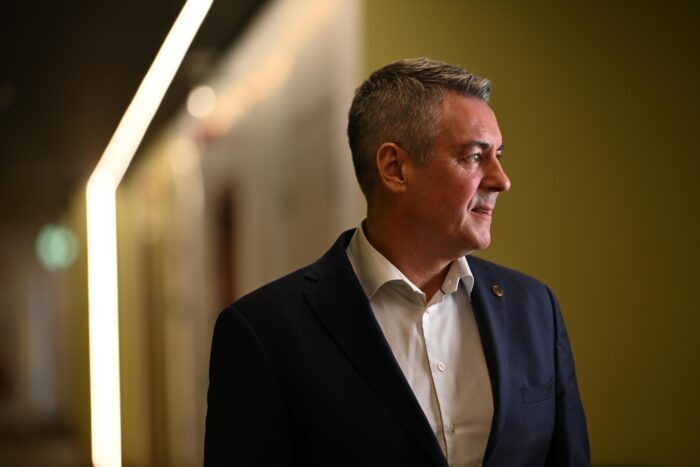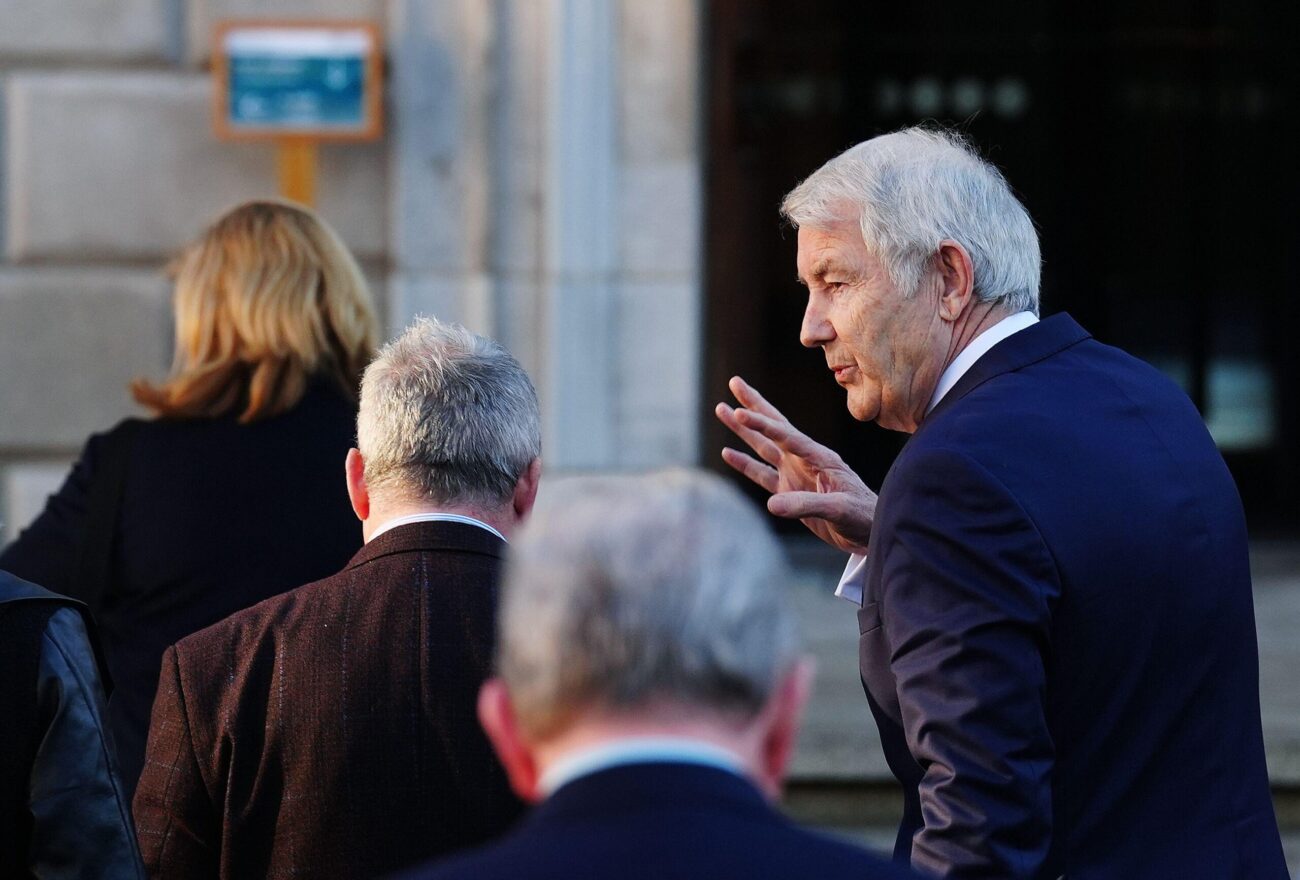Michael Lowry’s vertiginous political rehabilitation, evidenced by his influence and power in government formation, has also refocused attention on the findings of the Moriarty Tribunal.
This is, in itself, a good thing. The tribunal chronicled a grubby period in Irish public life, and it is important that its conclusions are remembered, and not, as Lowry would choose, relegated to a historical footnote.
Lest anyone forget, the Moriarty tribunal found that Lowry, then minister for communications, delivered the State’s second mobile phone licence for the businessman O’Brien. It said O’Brien later sought to confer a material benefit on Lowry.
It also found that O’Brien transferred £477,000 (€569,000) to various Lowry-controlled accounts, arranged for a US$50,000 loan to Fine Gael (it was returned), and supported Lowry in obtaining a £420,000 bank loan. Mr Justice Michael Moriarty found that the payments were “demonstrably referable to the acts and conduct” of Lowry while he was minister.
Whenever anyone cites the findings of the report, it is always followed by the following caveat: O’Brien and Lowry have publicly rejected the findings, but have never legally challenged them. It is a caveat that is rarely afforded to others criticised by a tribunal of inquiry (I am thinking of, for example, Bertie Ahern), but O’Brien and Lowry are highly litigious, and it is easier to put the line in and move on. I do it myself.
However, while Mr Justice Moriarty’s work has gained increased prominence, there has been little serious analysis of another period in Lowry’s life – the 2016 case at the Dublin Circuit Criminal Court when he and a refrigeration company he controls, Garuda, were convicted of two charges each of delivering an incorrect corporation tax return and failing to keep a proper set of records.
A more serious tax charge against the politician was dropped during the trial and the jury failed to reach a decision in regard to other charges, which the State did not then pursue.
Lowry and Garuda were fined a total of €25,000 for tax offences while Lowry was disqualified from acting as a company director for three years. Judge Martin Nolan said he did not believe a custodial sentence was warranted. Nor did he think community service was apt.
The judge described Lowry as a “conscientious taxpayer” and accepted evidence that he previously “put his hand in his pocket” to settle a €1.4 million tax bill in 2007, related to matters dating back to 1997. He said Lowry had no previous convictions, was a good employer and a very good public representative. After the sentence was delivered by Judge Nolan, Lowry told reporters outside the court building that he had come in a free man and was leaving a free man.
However, it is still worth revisiting the evidence given during the trial because some of the details are intriguing.
At the beginning of the trial, Remy Farrell, a barrister for the prosecution, alleged that Lowry had cooked the books of his company Garuda, not once but twice – like refried beans, he said.
The court heard that Garuda, which trades as Streamline, had acted as a sales agent for Norpe Oy, a Finnish refrigeration company. As part of the arrangement, it took a five per cent commission on sales to Irish retailers. The main customer was Dunnes Stores.
In August 2002, Norpe made a sterling payment of £248,624 in respect of sales commission. It was a pretty hefty sum given that it equated to 88 per cent of the company’s certified gross profits for the year.
The payment was not made to Garuda. In the year in question, it posted a loss for the year citing difficult trading conditions. Instead, on Lowry’s instruction, it was rerouted to a third party, Kevin Phelan, via the Glebe Trust on the Isle of Man.
(Phelan’s name, you might recall, cropped up time and time again during the Moriarty Tribunal due to the land agent’s financial relationship with Lowry. The Tribunal concluded – in paragraph 16.125 of its final report – that an admitted payment by Lowry of £65,000 to Phelan “was for the principal purpose of presenting a contrived falsehood to the Tribunal”. Again, I will add the caveat that Lowry disputes this. Phelan did not give evidence to the tribunal.)
The reason or motive behind the diversion of funds was not explored before the jury. In fact, in his opening address, Farrell stressed that the identity of Phelan, a property consultant based in Omagh, Co Tyrone, was of no relevance to the issues the jury would have to decide.
This meant that secretly taped phone conversations between Lowry and Phelan (leaked to and published by The Sunday Independent) and other UK property deals, such as Doncaster Rovers, that came up during the tribunal were not a factor in this trial.
What was at issue was the handling of the Norpe transaction. As Francesca reported at the time, it was not accounted for as income on the books of Garuda in 2002, it did not feature on the director’s loan account, and no corporation tax was paid on the sum when the company filed annual returns for the year to Revenue.
It was alleged that Lowry diverted the funds for his own benefit and failed to declare the payment as income in his 2002 personal tax returns. However, this key allegation — the most serious against the TD — was dismissed by the judge mid-trial, following a defence application.
In what was characterised by the prosecution as an attempt to put the toothpaste back in the tube, Lowry directed his accountants, BBT, to deal with the Norpe payment in 2007. According to the prosecution, he pretended the commission was earned in 2006 and the money was duly accounted for in Garuda’s books for that period.
Former Norpe chief executive Fred Ramburg was the witness for the prosecution, giving evidence via videolink from Finland.
He was shown a signed agency agreement from November 1, 1997, between Norpe and Lowry. Lowry’s name was crossed out. Glebe Trust and an Isle of Man address was handwritten in its place. Ramburg agreed it was his writing, but said he could not recall when he had altered the document. He guessed it might have been in 2008.
He said he had “no clue” who Glebe Trust was.
At the sentencing hearing, defence barrister Michael O’Higgins described Lowry as an extremely hard-working public representative. He said the TD was also a businessman and a good employer who paid money up front to the Revenue to meet his tax liability rather than hide behind the limited liability of Garuda.
Having filed incorrect accounts, he had tried to do a “botch repair job” in 2006, bringing convictions down upon himself.
Judge Nolan noted Lowry had saved his company by putting his hand in his own pocket, even remortgaging his property to pay the taxes owing. While acknowledging the importance of honest tax returns, the judge added: “The Revenue have not been at a loss in relation to what occurred.”
Leaving the court, Lowry, despite the convictions, was jubilant. “This, today, is the culmination of 22 years of investigations, of inquiries,” he said referring to his historic tax woes and the Moriarty Tribunal.
“Nobody understands unless you are in the position, if you’ve been harassed, chased and hounded by various institutions of the State. It’s only when you are in that position, and fortunately I had the strength, I had the courage and I had the conviction and the reason I had was very simple. I knew in my heart and my head that I didn’t do the kind of wrongs . . . portrayed.”
Nonetheless, just as the findings of the Moriarty Trubual still stand, so too do the convictions.
On Wednesday, we published a column by Sam Smyth, one of the country’s finest journalists. Lowry has twice sought to sue Smyth personally, alleging defamation. Smyth showed fortitude and resolve in standing up for himself despite the huge personal toll the actions had upon him.
Sam did not buckle, and in his column, he expresses his frustration about the Government’s dealings with him.
“And, like the Taoiseach and the Tánaiste, the leader of Sinn Féin, and all of the members of the Dail, I concur with every finding, including corrupt behaviour, made about Lowry by the Moriarty tribunal. And yet after all this history, Lowry has reemerged on the political stage as a would-be kingmaker,” he wrote.
A final caveat: Lowry, of course, rejects the findings of the Moriarty Tribunal.
Elsewhere last week…

Under Frank O’Keeffe’s watch, EY Ireland has tripled in size since 2018. I sat down with him recently, where he reflected upon his journey, outlined the firm’s expansion strategy, and gave his views on Ireland’s economic outlook.
Plus, to ensure that Ireland remains an attractive investment destination, O’Keeffe outlined key areas that need continued focus.
“We have to make sure that we’ve got the right tax environment — more importantly that we’re ensuring that we’re bringing forward the right skills, the right talent from Ireland, but also attracting those skills from within the EU,” he says.
“We have to make sure that we really double down on the infrastructure, build out within Ireland, but specifically in high-density areas.”
Shares in Glanbia fell dramatically last week after the Irish food giant said it expected earnings to fall by up to 11 per cent this year. The outlook was driven by the rising price of whey, a key raw material, but the share fall also followed a decision to sell SlimFast and the Benelux e-commerce business Body & Fit.
I spoke with Glanbia’s CFO Mark Garvey about the share price fall and the group’s future outlook, while Thomas analysed the company’s performance, focusing on the long-term price of whey.
“Commodity price volatility is nothing new in the dairy industry – nor are overreactions by stock markets. In fact, managing them is exactly what a company like Glanbia should be good at,” according to Thomas.
Irish corporate finance firm Focus Capital Partners has joined forces with US-based Focus Investment Banking through a strategic buyout. CEO Robert Adams explained to Tom the rationale for the deal and outlined why a London office is next.


